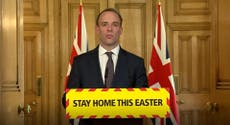Millions of British people are facing hunger – and our benefits system isn’t prepared
Help The Hungry: This campaign shows the best of Britain – people coming together to help each other through a crisis. Our collective priority is to ensure that the new poor, who have suddenly lost their livelihoods, have enough to eat

When society’s safety net develops a hole, it is the most vulnerable who fall through. When the charitable safety net, which sits under the official one, develops a hole, the problem is multiplied.
That is what has happened in the wake of serious damage to employment and income caused by the lockdown in the UK. Many people are not – or not yet – being helped by the official safety net of universal credit and other targeted benefits. And the unofficial safety net of charitable support, specifically food banks, is also damaged by the drying-up of funds, the isolation of elderly, vulnerable and infected volunteers, as well as the closure of agencies dispensing food vouchers like Citizens Advice.
It should be an absolute, irreducible bottom line that no one in this country goes hungry. If the government moves quickly to help charities in trouble, if supermarkets continue to divert essential foodstuffs to those in greatest need, and if councils can reallocate under-employed staff to the essential work of staffing food banks then there is no reason why anyone should. At the very least, the 1.5 million people who are reported to be going whole days without food need to know that help is at hand now, both locally and unconditionally.
However, in more normal times food banks are only a temporary and limited source of support. Their very existence exposes the weaknesses in our system of social protection. The essential point about hunger – even in famine conditions in the poorest countries – is usually not the lack of food but the fact that the poorest lack the income to buy it.
The same is true in Britain: there is plenty of food in supermarkets, despite the greed of the hoarders, but prices are rising. Even if poor people can cover their food bills, there may be insufficient money left for rent, or essential transport or for the household necessities. An estimated 1.7 million are currently unable to buy enough food and 2.2 million are thought to be unable to pay the rent or the mortgage. The numbers are growing rapidly.
The big challenge to government, now, is to get money quickly into the hands of the hundreds of thousands (and soon to be millions) who are suddenly thrown into poverty by the loss of employment or self-employment income. The government’s furlough scheme mitigates the former, and the self-employment package will help – but only for those who qualify and can afford to wait until June for income support.
The reason for transferring money to the casualties of the lockdown isn’t purely humanitarian. Economies are easier to shut down than they are to get going again; any recovery will depend critically on purchasing power – demand being injected back into the economy.
A key issue is whether it is best to channel money through our established and targeted, but complex, means-tested benefit system or to make universal payments to everyone, or almost everyone, to get the money flowing more quickly.
An approximation to the latter approach is being tried in the US, in the package agreed between Donald Trump and Congress: $1,200 (£946) for adults plus $500 (£394) per child. This “helicopter drop” approach has a legitimate role in fending off destitution and preventing a collapse in demand. But its use in the US reflects the absence of national European-style social security (though the package also has much-improved unemployment insurance cover). The payments don’t keep families going for much more than four weeks at low-income levels. Moreover, there is a means test attached: the benefit is phased out above an annual income of $75,000 (£59,000).
There are those who believe that this crisis provides an opportunity to scrap the UK’s complex, means-tested benefit system and also the system of tax-free allowances, replacing them with a simple basic income paid to everyone. I argued two weeks ago that we should be wary of those offering simple solutions to complicated problems. I found myself taken to task by those who felt (reasonably, up to a point) that I had not taken into account the more sophisticated analysis.
But my main point remains that the more we try to erase the differences in family situation (numbers of children; age profiles; degrees of disability; hours of work) the greater the risk of major anomalies and perceived unfairness from the losers. And there is a really tricky problem of finding a level of payment which keeps working-age adults and their families out of poverty (currently defined as 60 per cent of median income, which for a single parent with two children is around £200 a week) and is sustainable in the long run.
There is an immediate need to sort out the many glitches, cruelties and deficiencies in the current system. We are told that the Department for Work and Pensions can’t handle the volume of universal credit claims and is slow to respond. That is a good reason for sweeping away some of the procedures and policies that were put in place in the days when the Treasury’s priority was saving money and the political agenda was to prevent “scroungers” abusing the system and dodging work.
The lag between applying for universal credit and receiving it should be reduced to the technically feasible minimum, with claims paid straightaway once they are approved. There should be an end to the punitive two-child limit on the family element of the benefit, and some of the rigidities in the system – monthly not weekly payments, refusal to pay the housing element direct to landlords, payments to joint accounts instead of to mothers – should be relaxed where individual circumstances require it.
As the crisis recedes it will have exposed, like a retreating tide, a whole set of chronic problems which will soon become acute: work insecurity and low pay; skills shortages; the insecurity of “Generation Rent”; growing intergenerational unfairness.
The Independent and Evening Standard’s Help the Hungry campaign shows the best of Britain: people coming together to help each other through a crisis. Our collective priority is to ensure that the poorest and most isolated in society, including the new poor who have suddenly lost their livelihoods, do not suffer severe hardship.
The work and pensions secretary, Therese Coffey, is largely unknown, but I recall from government that she is underestimated. She now has a chance to match the innovation and compassion citizens are showing, by doing brave and big things with the benefits system. Rishi Sunak, as a promising new chancellor, will need to ditch old dogmas about taxation, to seek a bigger contribution from the wealthy.
The post lockdown economy will be one in which many more people need support.
Sir Vince Cable is a former leader of the Liberal Democrats




Join our commenting forum
Join thought-provoking conversations, follow other Independent readers and see their replies